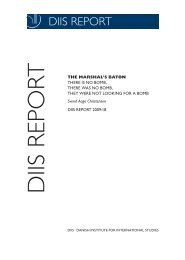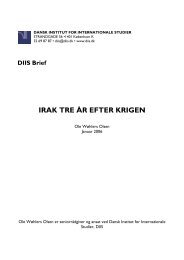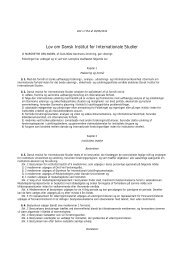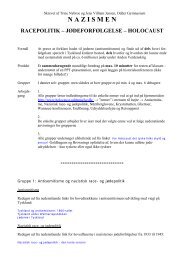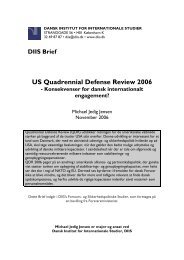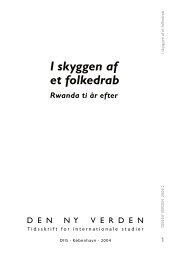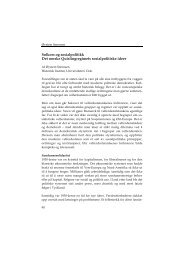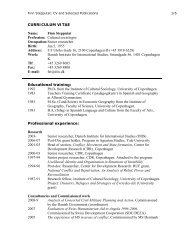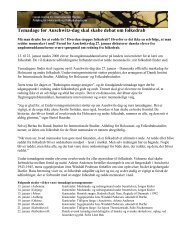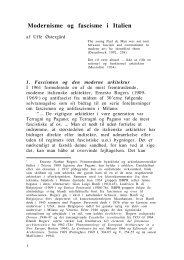- Page 1: Europæisering af forbrugerpolitik
- Page 6 and 7: INDHOLDSFORTEGNELSE 1. INDLEDNING .
- Page 8 and 9: Liste over forkortelser AE: Arbejde
- Page 10 and 11: En række andre forfattere har pege
- Page 12 and 13: I specialet vil vi analysere et enk
- Page 14 and 15: Specialet vedrører samspillet mell
- Page 16 and 17: de nævnte teorier og skabe vores e
- Page 18 and 19: Dette speciales casestudie kan med
- Page 20 and 21: Herudover tilhører Forbudsloven re
- Page 22 and 23: uformelle kontakter, aktørernes op
- Page 24 and 25: 2.4.2 Kildekritik En stor del af vo
- Page 26 and 27: forskeres analyser indgår som bagg
- Page 28 and 29: 3.1 Europæiseringsdebatten Begrebe
- Page 30 and 31: ”Processes of (a) construction, (
- Page 32 and 33: svagheder i forhold til specialets
- Page 34 and 35: innflytelse i EUs beslutningsproses
- Page 36 and 37: EU-positiv linje ud fra en ny måls
- Page 38 and 39: ”organized into an unspecified nu
- Page 40 and 41: 3.2.2 Netværkstilgangen I 1980’e
- Page 42 and 43: Tabel 3.2 Marsh og Rhodes Policy-ne
- Page 44 and 45: epræsentativitet, åbenheden i adg
- Page 46 and 47: der er sammenfaldende med de centra
- Page 48 and 49: incremental changes, thereby favour
- Page 50 and 51: Efterfølgende har vi ud fra en læ
- Page 52 and 53: Figur 3.2 Specialets analysemodel 1
- Page 54 and 55:
Under 1. Verdenskrig blev der nedsa
- Page 56 and 57:
Der er også en tydelig tendens til
- Page 58 and 59:
Specialudvalgets udkast til en dans
- Page 60 and 61:
politisk repræsentation af forbrug
- Page 62 and 63:
Forbrugerområdet er som tidligere
- Page 64 and 65:
KAPITEL 5 Forbrugerpolitik i EU I d
- Page 66 and 67:
egrænsede betydning for Fællesska
- Page 68 and 69:
For at gøre traktaten mere accepta
- Page 70 and 71:
mål skulle hjælpe til at opnå in
- Page 72 and 73:
De tre ovenfor nævnte EU-instituti
- Page 74 and 75:
KAPITEL 6 Europæiseringsmekanismer
- Page 76 and 77:
Der er dog forskel på, om dette pr
- Page 78 and 79:
epræsenterer forvaltningen, modsig
- Page 80 and 81:
ligger rammerne for diskussionen de
- Page 82 and 83:
Det er således helt klart, at alle
- Page 84 and 85:
KAPITEL 7 Europæiseringens konsekv
- Page 86 and 87:
Afhængig af sagsområde vil der s
- Page 88 and 89:
En anden fordel ved medlemskabet n
- Page 90 and 91:
forvaltning (Forvaltningsrepræsent
- Page 92 and 93:
input, fordi de i kraft af deres me
- Page 94 and 95:
Som ovenfor beskrevet er alle de da
- Page 96 and 97:
sag eller en ren dansk (Erhvervsrep
- Page 98 and 99:
Flere fra forvaltningen påpeger, a
- Page 100 and 101:
således i visse tilfælde være me
- Page 102 and 103:
eksisterede tidligere. Det har vide
- Page 104 and 105:
de europæiske organisationers hold
- Page 106 and 107:
direktiv, vil forvaltningen sjælde
- Page 108 and 109:
KAPITEL 8 Forbrugerkøbsdirektivet
- Page 110 and 111:
I løbet af 1980’erne arbejdede e
- Page 112 and 113:
Forbrugerrådet og Arbejderbevægel
- Page 114 and 115:
I holdningen til Direktivforslaget
- Page 116 and 117:
Den forenede modstand mod Direktive
- Page 118 and 119:
lev behandlet i Parlamentet (FBR 2.
- Page 120 and 121:
om ændring af reglerne i Købelove
- Page 122 and 123:
lovudkast var der kun enkelte begr
- Page 124 and 125:
største og mest ressourcerige orga
- Page 126 and 127:
Under den afsluttende implementerin
- Page 128 and 129:
henvendelser påvirkede forvaltning
- Page 130 and 131:
her, færrest organisationer deltag
- Page 132 and 133:
KAPITEL 9 Forbudsdirektivet og Forb
- Page 134 and 135:
interesseorganisationer i de enkelt
- Page 136 and 137:
Forbrugerrådet var positiv overfor
- Page 138 and 139:
gensidig anerkendelse og ønskede,
- Page 140 and 141:
organisationer (heraf 9 erhvervsorg
- Page 142 and 143:
Med hensyn til organisationers, og
- Page 144 and 145:
Desuden blev der i løbet af ét å
- Page 146 and 147:
modstanden mod bestemmelsen, så de
- Page 148 and 149:
9.6 Del-konklusion - europæisering
- Page 150 and 151:
9.7 Sammenligning af de to cases -
- Page 152 and 153:
konsensus, der var ganske lille ved
- Page 154 and 155:
til en vis grad som et udtryk for e
- Page 156 and 157:
synspunkter for at kunne forberede
- Page 158 and 159:
åderum og autonomi, men det er net
- Page 160 and 161:
de tidlige faser af processen, og k
- Page 162 and 163:
KAPITEL 11 Konklusioner Med dette s
- Page 164 and 165:
forløbet, sjældnere og på mere a
- Page 166 and 167:
tage et begrænset antal organisati
- Page 168 and 169:
11.4 Specialets resultater og europ
- Page 170 and 171:
Tendensen til at interesseorganisat
- Page 172 and 173:
Christensen, Bolette M. (1994): At
- Page 174 and 175:
Kallestrup, Morten (2004): Europæi
- Page 176 and 177:
Powell, Walter W. og Paul J. DiMagg
- Page 178 and 179:
Arkivhenvisninger - Købeloven (i k
- Page 180 and 181:
Arkivhenvisninger - Forbudsloven (i
- Page 182 and 183:
Bilag 182
- Page 184 and 185:
Bilag 2 - Direktiver og forordninge
- Page 186 and 187:
Eksempler på forordninger med bety
- Page 188 and 189:
Bilag 4 - Deltagende organisationer




